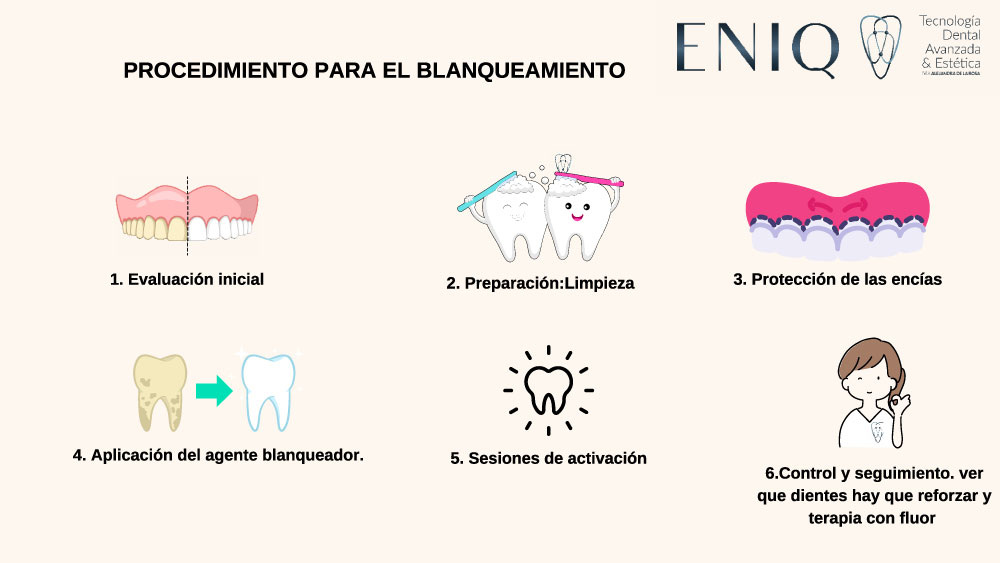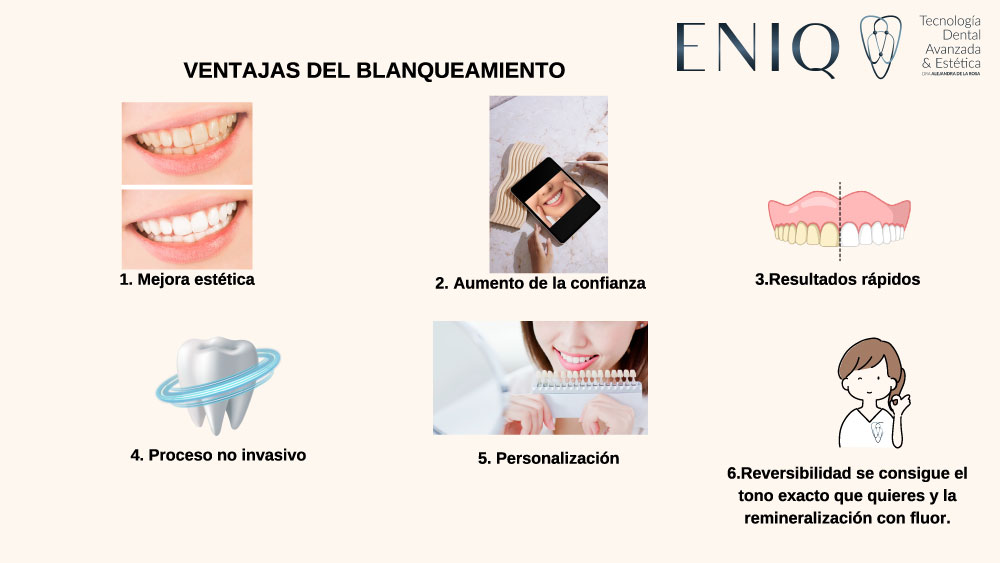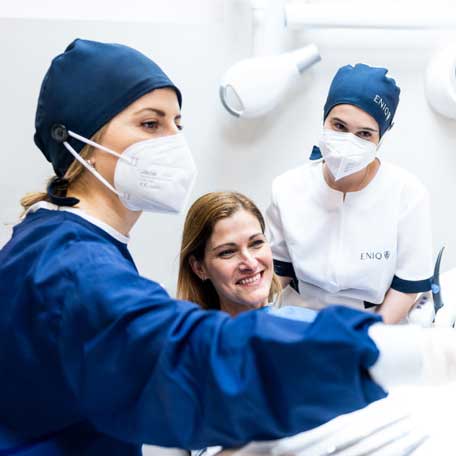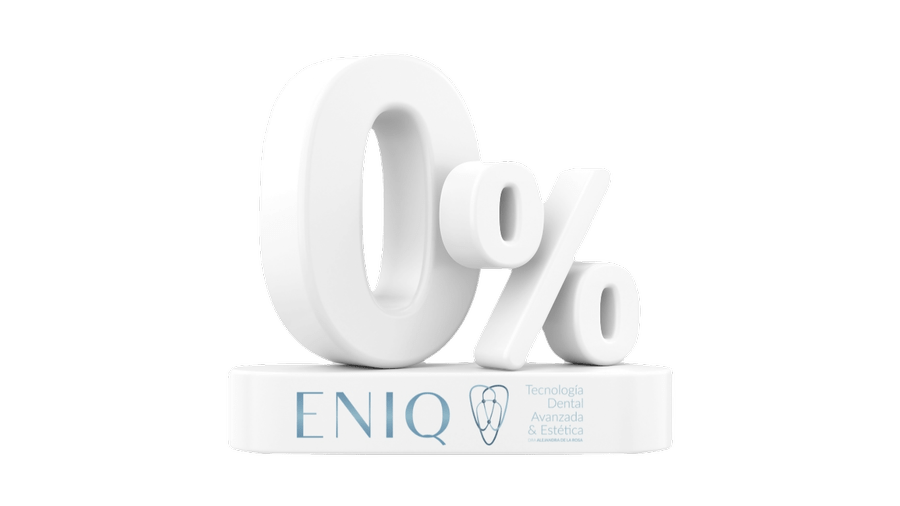

Teeth Whitening
State-of-the-art teeth whitening at ENIQ.
What is teeth whitening?
Custom teeth whitening is an aesthetic procedure performed to lighten the color of teeth and enhance their appearance. It involves the application of whitening agents to the tooth surface to remove stains and discoloration, restoring a whiter and brighter shade to the teeth.
Custom teeth whitening is typically done in a dental clinic, although there are also at-home whitening kits that can be used under the supervision of a dentist. Before the procedure, it's important for a dental professional to assess the patient's dental health and determine if they are a suitable candidate for whitening.
The custom whitening process usually involves the use of a whitening gel containing hydrogen peroxide or carbamide peroxide. This gel is applied to the tooth surface and activated by a special light source, such as a cold light lamp or a laser. The light helps accelerate the whitening process and achieve faster results.
The duration and number of sessions for custom teeth whitening can vary depending on the initial level of discoloration and the patient's whitening goals. It's important to follow the dentist's instructions and not exceed the recommended application time for the whitening gel, as overuse can lead to dental sensitivity.
It's essential to note that custom teeth whitening is not permanent, and over time, teeth may regain some degree of discoloration due to factors such as diet, tobacco use, and certain medications. However, steps can be taken to maintain whitening results, such as avoiding foods and beverages that stain teeth and maintaining good oral hygiene.
What is the teeth whitening procedure like?
The teeth whitening procedure generally follows these steps:
- Initial evaluation: Before starting whitening, a dentist will assess the patient's dental health, checking for cavities, periodontal disease, or other issues that may affect the procedure. The initial color of the teeth will also be determined, and expected results will be discussed.
- Preparation: In some cases, a professional dental cleaning is performed to remove tartar and plaque before whitening. This helps improve the effectiveness of the procedure.
- Gum protection: The dentist or dental assistant will apply gum protection or a gingival barrier around the teeth to shield the gums and soft tissues from direct contact with the whitening agent. This helps prevent irritation and sensitivity.
- Application of the whitening agent: A whitening gel is applied to the tooth surface. This gel typically contains hydrogen peroxide or carbamide peroxide as the active ingredient. Depending on the system used, the gel may be activated by a special light source, such as a cold light lamp or a laser.
- Activation sessions: If a special light source is used, the dentist may perform several activation sessions during the whitening procedure. Each session can last between 15 and 30 minutes. During this time, the whitening gel is left in contact with the teeth and activated with the light to accelerate the whitening process.
- Monitoring and follow-up: Throughout the procedure, the dentist will supervise the progress of whitening and assess the dental response to the whitening gel. If necessary, additional applications can be done to achieve the desired results.
It's important to note that the teeth whitening procedure may vary depending on the system used and the dentist's preferences. Instructions and recommendations for post-whitening care may also be provided, as well as the possibility of periodic maintenance sessions to prolong the achieved results. It's always advisable to follow the dental professional's guidance for the best results and to avoid potential complications.

What are the advantages of teeth whitening?
Teeth whitening offers several advantages and benefits, including:
- Aesthetic improvement: Teeth whitening can significantly enhance the aesthetic appearance of teeth by removing stains, discolorations, and yellowing. Whiter and brighter teeth can provide a more attractive and youthful smile.
- Increased confidence: Having whiter and more attractive teeth can boost a person's confidence and self-esteem. A radiant smile can make one feel more confident when interacting with others in social and professional situations.
- Quick results: Compared to other cosmetic dental treatments, teeth whitening generally offers fast results. In many cases, significant improvements can be noticed after one or two whitening sessions.
- Non-invasive process: Teeth whitening is a non-invasive procedure that does not require surgery or tooth extraction. It is performed externally on the tooth surface, making it safer and more comfortable for most patients.
- Customization: Teeth whitening can be tailored to the individual needs and preferences of each patient. Dentists can adjust the concentration of the whitening gel and treatment time to achieve personalized desired results.
Although teeth whitening has numerous advantages, it's important to recognize that not all cases of dental discoloration are suitable for this treatment. In some cases, other options such as dental veneers may need to be considered to achieve the desired results. A dentist can evaluate each patient's specific situation and recommend the best approach.

Duration
How Many Appointments Are Needed for Gum Contouring?
The number of appointments required to complete gum contouring can vary depending on the method used and the patient's needs. In general, there are three common approaches:

Number of Appointments Required:
- Single-session Clinical Whitening: This method involves completing the entire teeth whitening procedure in a single visit to the dental clinic. The session may last approximately one to two hours, depending on the system used. It's important to note that in some cases, an initial evaluation appointment may be required before the whitening session.
- Multiple-session Clinical Whitening: Some dentists may choose to divide the whitening process into several clinical sessions. Typically, these sessions are scheduled with several days in between, allowing the patient to undergo the treatment in stages. The number of sessions required may vary depending on the system used and the patient's response to the treatment.
- Combination Whitening: Combination whitening combines clinical sessions at the dental clinic with the use of a supervised at-home whitening kit. In this case, an initial clinical session is usually performed to achieve quick results, followed by the delivery of a whitening kit for home use. The patient will carry out the whitening at home over a specified period, following the dentist's instructions.
It's important to note that the duration and the number of appointments required may vary depending on the dental situation and the patient's preferences. A dentist will be able to assess the individual case and determine the most suitable approach, as well as provide a personalized treatment plan.

What's Better: Mixed Whitening or Single Clinical Session?
The choice between mixed whitening or a single clinical session depends on the individual preferences and needs of each patient. Both methods have their advantages and specific considerations:
- Mixed Whitening:
- Mixed whitening involves a combination of clinical sessions at the dental clinic and the use of a dentist-supervised at-home whitening kit.
- In the dental clinic, an initial whitening session can be performed to achieve quick and significant teeth whitening.
- Then, the patient is provided with an at-home whitening kit, which includes customized dental trays and a low-concentration whitening gel.
- The patient will perform whitening at home, following the dentist's instructions, for a specified period (usually several weeks).
- Mixed whitening allows for more personalized control of the process, as the patient can adjust the duration and frequency of at-home applications as recommended by the dentist.
- Single Clinical Session Whitening:
- Single clinical session whitening involves completing the entire teeth whitening procedure in a single visit to the dental clinic.
- In this session, a high-concentration whitening gel is applied to the teeth and activated with a special light source, such as a cold light lamp or a laser, to accelerate the process.
- This method offers faster results since whitening is completed in a single session, which can be beneficial for those seeking quick results or have time constraints.
It's important to note that the choice between both methods may depend on factors such as the initial degree of discoloration, the patient's dental sensitivity, and the dentist's recommendations. By assessing each case individually, the dentist can provide a more precise and suitable recommendation based on the patient's needs and preferences.
Is Over-the-Counter Teeth Whitening Effective?
IS OVER-THE-COUNTER TEETH WHITENING EFFECTIVE?
Over-the-counter teeth whitening involves the use of teeth whitening kits that can be purchased at pharmacies or stores. These kits typically include generic dental trays and a low-concentration whitening gel applied to the trays, which are then placed on the teeth for a specified period.
Although over-the-counter teeth whitening can help reduce mild stains and discolorations, its results may vary and may not be as noticeable as those obtained with professional treatments. This is due to several reasons:
- Whitening Agent Concentration: The whitening gels used in over-the-counter dental whitening kits often have a lower concentration of hydrogen peroxide or carbamide peroxide compared to products used in dental clinics. This can limit the effectiveness of whitening and require more prolonged use to achieve comparable results.
- Customization and Supervision: Over-the-counter dental whitening kits offer a generic solution for all users, without individualized adaptation to each person's dental situation. Additionally, there is no direct supervision by a dentist during the process, making it difficult to properly control and monitor the treatment.
- Application Technique: The application technique of the whitening gel can vary among users. Incorrect or inconsistent application can affect the effectiveness of the treatment and the results obtained.
If you choose over-the-counter teeth whitening, it's important to follow the manufacturer's instructions and consult with a dentist before starting the treatment. A dentist can assess the dental situation and provide personalized recommendations. Additionally, the dentist may offer additional options, such as mixed whitening, which combines clinical sessions and the use of dentist-supervised at-home whitening kits for better results.
What are the benefits of getting teeth whitening at ENIQ?
Undergoing teeth whitening with technology can offer several additional benefits compared to traditional methods. Some of the benefits of using technology in teeth whitening include:
- Faster Results: The technology used in teeth whitening, such as cold light lamps or lasers, can expedite the whitening process and provide quicker results compared to conventional methods.
- Increased Effectiveness: Technology applied in teeth whitening can enhance the effectiveness of the treatment, allowing for greater removal of stains and discolorations on the teeth. Advanced systems can offer more consistent and noticeable results.
- Reduced Dental Sensitivity: Some technologies used in teeth whitening are designed to minimize dental sensitivity associated with the treatment. State-of-the-art systems can reduce discomfort during and after the procedure, making the experience more pleasant for the patient.
- Treatment Customization: Technology can enable a more personalized approach to teeth whitening. Advanced systems can be tailored to the individual needs and preferences of each patient, allowing for more precise control of the whitening process and intensity.
- Professional Supervision: By using technology in teeth whitening, more accurate supervision can be provided by the dentist. This ensures that the treatment is conducted safely and effectively, minimizing risks and maximizing results.
It's important to note that not all technology methods used in teeth whitening are the same, and results may vary depending on the system and the experience of the dental professional. Consulting with a dentist specialized in teeth whitening technology can provide a better understanding of the specific benefits that can be obtained with different technological approaches.
What is the price of teeth whitening?
The price of teeth whitening with trays ranges from 200 to 250 euros.
On the other hand, the price of teeth whitening with a lamp usually costs between 300 and 350 euros.
Finally, the price of combined teeth whitening (lamp + trays) is typically between 450 and 550 euros.

- Financing: Up to 24 months with no interest. Up to 60 months with preferential conditions.
- Payment installments: Pay for the treatment in comfortable monthly installments.
- We offer a prompt payment discount: Pay for the entire treatment upfront.
- Multiple payment options: Direct debit, credit card, cash, bank transfer, Apple Pay, Google Pay, and Bizum.
Dental Contouring
Perfect Gums
*subject to specialist assessment
Discover the perfect solution for achieving a brighter and more radiant smile with our high-quality teeth whitening service. Designed to meet your aesthetic needs and deliver noticeable results, our teeth whitening treatment is the key to saying goodbye to stains and discolorations.
-
All-inclusive
-
Interest-free Financing
Frequently Asked Questions
Do you have more questions about teeth whitening?
The duration of teeth whitening can vary depending on various factors, such as the method used, post-treatment oral care habits, and the patient's lifestyle factors. In general, teeth whitening is considered to last between 1 and 3 years, but it is important to note that this can vary from person to person. Some factors that can influence the duration of teeth whitening are:
- Oral care habits: Maintaining good oral hygiene, brushing teeth regularly, using dental floss, and using recommended mouth rinses can help maintain the results of teeth whitening for a longer time.
- Consumption of pigmented foods and beverages: Foods and beverages such as coffee, tea, red wine, tomato sauce, and carbonated drinks can stain teeth over time. Reducing the consumption of these products or rinsing the mouth after consuming them can help prolong the results of teeth whitening.
- Tobacco and tobacco products: Smoking and using tobacco products can cause stains and discoloration on teeth. Avoiding tobacco and its derivatives can help maintain the results of teeth whitening for a longer time.
- Overall dental health: The state of dental health, including gum care and treatment of any underlying dental issues, can influence the duration of teeth whitening. Regular visits to the dentist for check-ups and professional cleanings can contribute to maintaining the results of teeth whitening.
It is important to emphasize that teeth whitening is not permanent, and over time, teeth may regain some degree of discoloration. However, steps can be taken to extend the results, and if desired, additional teeth whitening sessions can be performed in the future to maintain or renew the whitening effect.
When performed under the supervision of a dental professional, teeth whitening is generally safe. However, it is crucial to follow the instructions and avoid overuse.
Teeth whitening, when done correctly and under the supervision of a dental professional, is not considered harmful to dental health. However, it is important to consider certain aspects and considerations:
- Tooth sensitivity: Some people may experience temporary tooth sensitivity during or after teeth whitening. This is usually mild and resolves on its own over time. However, if you experience persistent or severe tooth sensitivity, it is advisable to consult your dentist.
- Damage to gums and soft tissues: If the whitening gel comes into contact with the gums or soft tissues of the mouth, it can cause irritation or burns. It is important to follow the product instructions and apply the whitening gel precisely and in a controlled manner. In dental clinic treatments, the dentist will properly protect soft tissues.
- Effect on dental restorations: Teeth whitening may not have an effect on dental restorations such as fillings, veneers, or crowns. If you have restorations on visible teeth, you may need to replace them after teeth whitening to match the new color of your teeth.
- Excessive or incorrect use: Excessive or incorrect use of whitening products can cause damage to the teeth, such as enamel wear. It is important to follow the product instructions or dentist's recommendations to avoid problems.
It is essential to remember that teeth whitening should be performed by a qualified dental professional. Before undergoing any teeth whitening procedure, it is advisable to consult your dentist to assess your dental health and determine if you are a suitable candidate for the treatment. The dentist can provide proper guidance and perform the procedure safely and effectively.
Not everyone is an ideal candidate for teeth whitening. Consult your dentist to assess your dental health and determine if the procedure is suitable for you.
